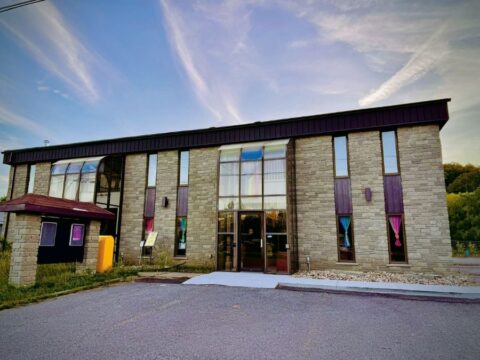“It’s the best of times and the worst of times for Kairos,” says Mary Corkery from her cellphone. The executive director of the group also known as Canadian Ecumenical Justice Initiatives is on a train headed for Ottawa. She flies to Winnipeg later in the week to meet volunteers and build support for a campaign on climate change, human rights and energy resources.
Kairos was formed eight years ago through the amalgamation of 10 interchurch coalitions working on social justice, poverty, corporate responsibility, human rights and Indigenous issues. These days, it’s riding high on a wave of publicity following a church leaders’ visit to Alberta’s oil sands and optimism generated by a national gathering in Waterloo, Ont., last summer that drew 350 volunteers — long-time coalition activists plus about 50 younger recruits.
You may unsubscribe from any of our newsletters at any time.
But Kairos is also riding out the aftermath of last year’s financial storm. It began with a 255 percent rent hike that came with a move to new offices. Then the United Church— Kairos’s largest church supporter— cut its annual grant by nine percent to $563,650. It wound down the year with about $235,000 in investment capital losses and unexpected cuts from two more funding sources. Faced with deficit budgets and more funding cuts, Kairos trimmed five of 26 staff positions and dropped programs on international debt and trace, refugees, corporate accountability and poverty.
United Church staff and volunteers say the health of Kairos is increasingly important because the General Council recently cut its own staff and justice programs — and more cuts are on the way. Rev. Joanne McFadden, a United Church representative on the Kairos board, says, “the role of Kairos will continue to grow as there are more staff cuts [in the United Church], as we are trying to move the focus from the national church . . . and getting congregations to pick up more of the justice work. It is an irony, really, that as we’re going to need Kairos more, we’re funding it less.”
Rev. Bruce Gregersen, General Council officer for programs — the senior church staffperson who oversees both the Kairos grant and the church’s own social justice staff — flatly rejects suggestions that the church’s increased reliance on Kairos’s specialized social justice work could be seen as downloading. Still, there’s little doubt among Kairos volunteers, including McFadden, that the organization will be left bearing an even larger burden of church justice work. At the same time, it’s difficult to measure Kairos’s effectiveness and, given all the cutbacks, whether it can adjust quickly enough to ensure its own survival. One thing is certain: the crisis has led the organization to focus its broad-reaching mandate.
ON AN EARLY OCTOBER MORNING, a group of Kairos staff and visitors are meeting with a global partner from Ecuador at their new second-storey downtown Toronto offices. The space is bright but modest, decorated with human rights posters, batiks and woven wall hangings. The only immediate evidence of budget cuts is a small, unoccupied office that will be rented out to defray costs.
Last year’s financial wake-up call forced Kairos to consult with its members, including the United, Anglican, Roman Catholic, Christian Reformed, Evangelical Lutheran, Presbyterian and Quaker churches, as well as the Mennonite Central Committee Canada. By the end of April, the Kairos board had zeroed in on a cluster of issues with good resonance among Canadians: ecological justice and climate change, economic sustainability, human rights and Indigenous rights.
In the short term, the new focus ends popular programs like refugee advocacy and the $150,000 anti-poverty fund that once financed small local projects across Canada. Kairos also relies more than ever on about $1.6 million a year in government funding from the Canadian International Development Agency.
Two new jobs were created to increase outreach through the Internet and regional events. In the long term, the cost-cutting and changes may give Kairos time to plan more regional events, build up reserve funds, develop a strategy to raise money from individuals and increase its Internet presence. “If you just cut, you’re on a downhill spiral . . . and you don’t ever get out of it,” says Corkery. “What you have to do is rebirth the organization.”
Back at the office, Nik Beeson, the new media co-ordinator hired to expand Kairos’s online communication, is poring over the manual for a new video camera. He’ll be filming campaign events and interviews with visiting partners to post on YouTube. He is also creating a Facebook page and Twitter feed, reaching out to young people and giving longtime activists new ways to keep in touch. Beeson hopes the 3,000 visits to the Kairos website each month will increase.
ASIDE FROM WEBSITE VISITS, what are Kairos’s partners getting from this organization and its $3.8-million budget? To be fair, the effectiveness of activities such as lobbying, letter-writing and protesting cannot be measured until their objectives are achieved — for example, world leaders make policies to curb global warming or governments opt to preserve human rights for political dissidents.
But some of Kairos’s work can be quantified: the organization funnels about $1.5 million a year to other non-governmental organizations or church groups working on human rights, development or environmental issues around the world; it has 2,500 printed copies of three climate justice campaign booklets available; the regular Kairos Times newsletter and campaign updates are emailed to 2,000 addresses; and about 1,000 people make annual donations.
Kairos claims 18 million Canadians — all those affiliated with the seven churches included in Kairos — as its constituency. The number of active volunteers and participants is much smaller. There are 60 ecumenical Kairos groups but their exact numbers are not known. “We want to keep it open,” says Corkery of group membership.
The 2008 Kairos annual report points to “hundreds of educational events . . . held by local churches and our grassroots network on issues ranging from affordable housing to fair trade olive oil, from the Canada-Colombia Free Trade to eco-spirituality.” Last year’s report also said 50 communities held “events as diverse as at-home 100-mile meals to large worship services under the stars.”
Still, longtime Kairos volunteer Susan Draper of Victoria’s Cadboro Bay United worries that local church recognitionof Kairos is “hit and miss The average person in the pews, unless they have taken part in some petition or campaign, doesn’t know what Kairos is up to.”
As Kairos’s regional representative for British Columbia and the Yukon, Draper is connected to two Kairos groups in Victoria. She says there is a “disconnect” between the activists involved in ecumenical groups and average church members. “You produce these great resources, but you never know whether people are using them.”
There is evidence United churches have been using the Kyotoplus petitions received in General Council’s August InfoPac mailing that goes to all congregations: Kairos reported a spike in returns in early September. In many areas, though, the messages aren’t getting through. Veteran social activist Rev. Susan Eagle, minister at the Delaware-Kilworth (Ont.) pastoral charge near London, Ont., says people in the pews “don’t know Kairos exists.” If they do hear about resources being offered, congregations “have to go looking for them.”
UNTIL RECENTLY, part of Kairos’s challenge had been trying to do all the work of its 10 founding coalitions with less money and, arguably, a less clearly articulated mandate. The organization’s redefined mandate and clearer focus should make connecting with church people and the public easier.
Still, prophetic actions are never easy and rarely recognized. As Kairos organizer Jim Lindsay of Trinity United in Orangeville, Ont., says, the organization “tends to take on issues that haven’t made the front page.” By the time they do, Kairos has often moved on. The United Church was mocked in the media three years ago after following Kairos’s recommendation to ban bottled water in offices and meetings. Many municipalities and schools are being commended for doing the same thing today.
Being ahead of their time, though, is something social activists take for granted. In Victoria, Susan Draper first got involved with ecumenical social justice work through 10 Days for Global Justice and stuck with Kairos as it continued that work. For her, “social justice is a big part of the Christian message,” and she hopes faithful people will continue to catch that vision. The challenges facing Kairos now, she says, may simply be another step in a journey toward a more just future.
“Changes come and go, and money comes and goes. But people who are going to walk this path will continue.”
***
This story first appeared in The United Church Observer’s December 2009 issue with the title “Retooling for justice.”














